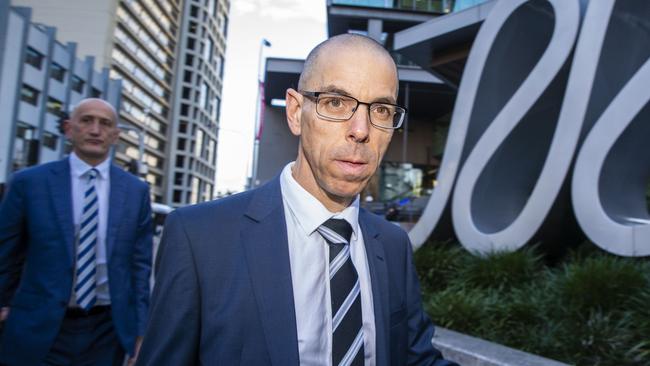Banking royal commission: ANZ says Landmark loan defaults higher than expected
An executive was “not aware” of stress-testing done before the ANZ bought bad-loan laden rural financier Landmark.

ANZ’s head of commercial lending services Ben Steinberg says he was “not aware” of any stress-testing by the bank of the assets on the books of its Landmark acquisition in 2010.
About a third of rural lender Landmark Financial Services’ loans were impaired or considered high-risk of default within three years of being taken over by ANZ.
ANZ’s $2.4 billion takeover of Landmark was today put under the microscope at the royal commission into banking and financial services.
By 2013, $277 million worth of Landmark loans were impaired or considered high risk — a total of 1050 loans accounting for about a third of Landmark’s assets, counsel assisting the royal commission Rowena Orr told the commission’s hearing in Brisbane.
Ms Orr yesterday said ANZ had disclosed several incidents of misconduct in its submissions relating to farmer clients who had held loans with Landmark. They involved improper collection of debts, inappropriate sales practices and inappropriate lending by staff, she said.
Mr Steinberg today conceded that the bank failed to act fairly and reasonably and in an ethical manner in its dealing with a customer whose loan was impaired. But he said ANZ was still investigating whether it breached the bankers’ code of conduct.
Mr Steinberg agreed with Ms Orr that the amount of loans falling into default was worse than the bank expected.
Minutes of an ANZ board meeting from August 2015, presented by Ms Orr to the royal commission and which were not included in Mr Steinberg’s witness statement to the inquiry, showed the ANZ board had discussed a paper titled “Farming Segments Support Strategy”.
The royal commission heard that in those meeting minutes, ANZ said there was “a lesson to be learned from the Landmark acquisition in connection with assumptions in delinquencies and losses that were not stress-tested”.
Mr Steinberg was unable to tell the royal commission what assumptions were made about loan performance in connection to the Landmark acquisition.
“The losses were ultimately higher than what we expected them to do be,” Mr Steinberg said. “We hadn’t done that work certainly correctly in the way it worked out.”
Mr Steinberg said he had not seen any stress-testing in relation to the Landmark acquisition before appearing at the royal commission.
Ms Orr asked if “there was no stress-testing of the expected losses” on the takeover.
Mr Steinberg said he was “not aware” of any stress-testing.
The dealings with farm customers by ANZ, NAB, Rabobank, CBA and Rural Bank (Bendigo) are being examined by the royal commission in its Brisbane hearings.
Some banks have admitted in pre-statements that they have found cases of misconduct relating to farm lending, or incidences when they did not meet community expectations or the banking code of conduct.
Ms Orr identified key issues to be exposed during the week, including contentious non-monetary defaults that often led to farm foreclosures. They occurred when farmers had not missed loan repayments but had a higher interest rate or foreclosure notice issued by their bank because reduced land valuations had changed debt-to-equity ratios on paper, triggering defaults or hiking penalty interest rates.
Another issue to be examined is the number of farmers who fell into financial trouble after banks bought the loan books of other lending institutions and then changed loan conditions or interest rates in a way that was unfavourable to customers.




To join the conversation, please log in. Don't have an account? Register
Join the conversation, you are commenting as Logout